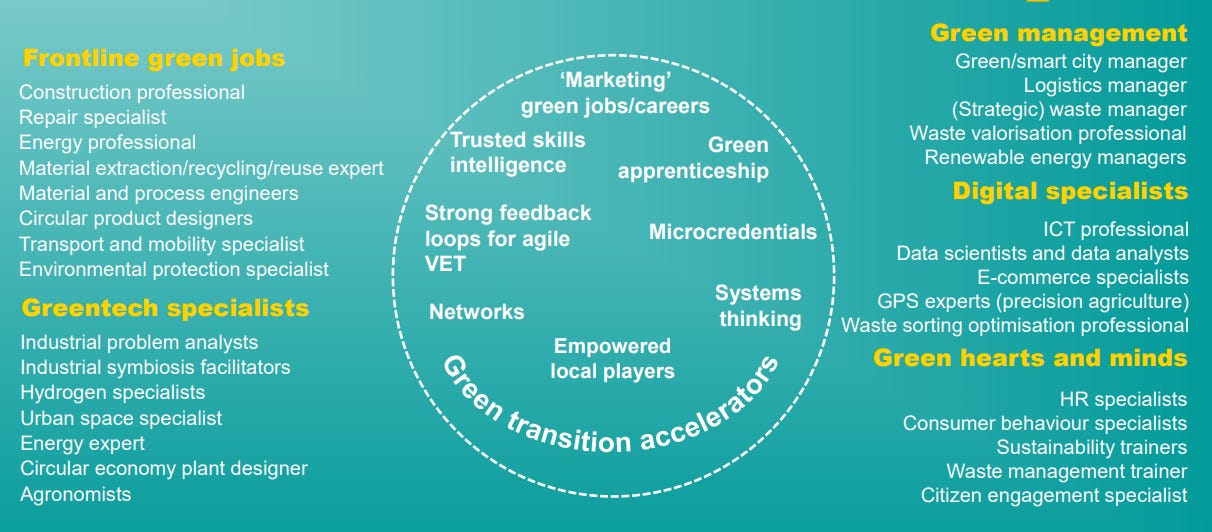Nudging to sustainability
Cedefop lists 'Hearts and Minds' as a group of green jobs. Do these contain the most hidden skills of all?
It’s time to fess up. The Green Edge makes the occasional mistake. Yes, it’s true, we are not infallible. Mind you, we never said we were; and given that at any one time we’re likely to be looking in many directions at once – from watching the bun fights between government and environmentalists over UK fossil fuels futures, to new recommendations on nuclear power, to interesting things happening in our own back yard, we’re bound to drop the occasional bijou clangette…
…which is exactly what happened earlier this week when we posted our latest Reports Roundup and gave out the wrong link for the first item. It was supposed to link to a Cedefop presentation on Vocational Education and Training (VET) for the green transition and instead came out as a link for a presentation on VET in farming. Ah well, in our defence both presentations did come from the same Cedefop event back in June. But still…
Anyway, we’ve repaired the damage. The link is now correct, but not before the email went out to all our subscribers, so apologies for that. Tell you what, we’ll send you our next post completely free of charge as compensation.
But as our old Mum, who had more than a passing talent for the mixed metaphor, used to say, it’s an ill wind that has no silver lining. On re-reading the VET for the green transition presentation to make sure we had the correct one this time, we looked again at this slide coming out of Cedefop’s foresighting work:
Source: Cedefop
We saw quite a few themes there that we regularly talk about ourselves: green apprenticeships, micro-credentials and systems thinking, to name but three. But, particularly when we looked at some of the more, shall we say, obscure job titles, they also struck a chord with something else we’ve been thinking about for some time. It’s this: over the last 5 years or so there have been a number of efforts to establish the potential scale of the green skills and jobs gaps. The Climate Change Committee and the Green Jobs Taskforce, for example, both took a fairly deep dive into it. The Resolution Foundation delved even further and used data from our old pal O*NET in the process. But, we’ve found that all of this work tends to focus on the visible and, as we posted last month, we don’t see much on under-reported or ‘hidden’ skills.
We’ve been doing a bit of digging here ourselves, piecing together insights from the various reports we’ve been reading over the last 24 months. Plus, we continue to have great conversations with folks in the thick of making green skills real. In so doing, a number of areas appear, whether as new occupations or as skills that might be spread across the occupations we all know about already. Things like sustainable supply chain management, where gaps might affect the development and supply of eco-products. Or carbon accounting and reporting, which is a specialist, technical skill.
Looking at the Cedefop image above, we can see some good examples in the various categories where less obvious, even hidden skills might come into play. For example, the Waste valorisation professional we see in the Green management group. What does this person even do? You won’t find the occupation listed in O*NET or ESCO (we checked), but a look on Wikipedia tells us that waste valorisation is the process of waste products or residues from an economic process being given economic value through reuse or recycling.
Of course, obvious really. We see that the Chartered Institute for Wastes Management (CIWM) is keeping a close eye on this, reporting last month that proposed new EC regulations for the European automotive sector on end-of-life vehicles are expected to facilitate better valorisation of 5.4 million tonnes of materials, as well as increased recovery of critical raw materials.
Waste makes an appearance in the Digital specialists group too, with the Waste sorting optimisation professional. Really? Absolutely! We learn that waste classification can be improved through machine learning, so stick that one on the list of our hidden skills. Or, if not exactly hidden, then a solid example of where specialist digital skills can be deployed in the furtherance of the circular economy (CE).
Talking of the economy which is circular, CE makes much more than a cameo appearance in Cedefop’s list. We see Circular product designers in the Frontline group, and Circular economy plant designers and Industrial symbiosis facilitators in Greentech, for example. An interesting one, though, also in the Frontline group is Repair specialist. As we CE watchers know, repair and prolong sit as nobler causes in the circular scheme of things, way above material extraction and recycling. But, as most of us are aware, repairing something is almost always harder than chucking the old one out and getting a new one, and in the same way repair skills are often of a higher order than, say, those for assembly or installation. So, yes, we certainly agree with Repair specialists being in the list of Frontline green jobs. Perhaps we might even put in a bid for Remanufacturing and Repurposing specialists to also be included.
There are others we might mention that align with where we think we might see unidentified skills gaps: Energy professionals, in particular around infrastructure rollout for renewable projects queuing up to get on the grid; Environmental protection specialists focusing on environmental justice and equity, inclusion and protection of marginalised communities, and nature-based solutions; Industrial problem analysts and Logistics managers for adaptation and resilience planning; and, of course, Materials engineers (not quite sure why Cedefop chose to group those in with Process engineers, though).
But it’s the final category, labelled Green hearts and minds, that we find of most interest, at least in the context of where the hidden skills might lie. This is around the triggering and management of the mass behavioural change that could be argued as being potentially the most important – and hardest to achieve – task involved in the restoration of a sustainable world.
At the corporate level, we suspect the transition of many human resource departments to ‘Green HR’ may be a bit of a stretch right now, although some farsighted educational platforms are beginning to provide courses for it.
On the Consumer behaviour specialists side, we suspect there are plenty of them out there working for the Zuckerbergs and Musks of this world, but strangely we don’t find it as an ‘official’ occupation in ESCO, which we assume has some kind of synching process with Cedefop (albeit at a relatively glacial pace). We do find Consumer rights advisors and Behavioural scientists in ESCO, but perhaps our Consumer behaviour specialists prefer to lurk in relative anonymity within the bowels of bodies like the Nudge Unit.
For sustainability training, we can find any amount of courses both online for the masses and for the business world. But we assume what Cedefop is referring to here are the sort of Sustainability trainers that go out and engage with the mass of population that wouldn’t dream of proactively seeking out their own education and may even think Coursera is that nice new SUV model from Seat.
Meanwhile, ESCO abounds in waste management occupations: officers, supervisors, inspectors, technicians, engineers, you name it. But not Waste management trainers. Not yet, anyway.
You see our point? As embodied in the last occupation on Cedefop’s list, Citizen engagement specialist, this is all about sustainability engagement and advocacy, stripping out the big words and explaining the plethora of policies, ambitions, posturing and sheer obfuscation coming from on high, and making sustainability real.
That might be the most hidden skill of all.







